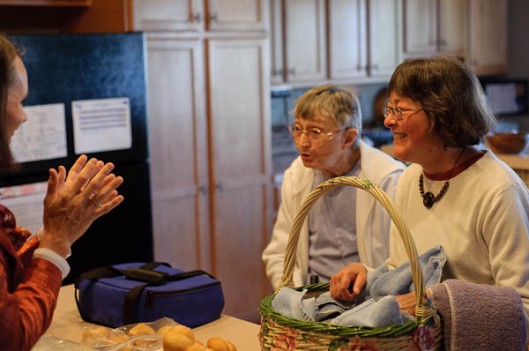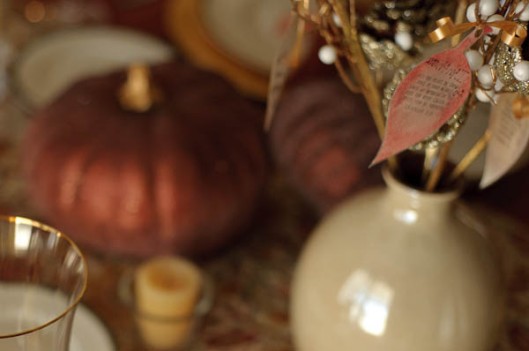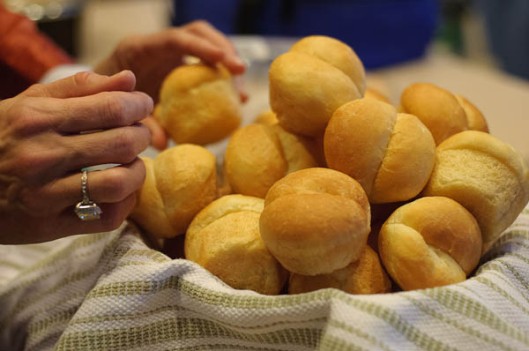feast day
Every day is a feast day, really–the table prepared and gilded, platters piled high, the celebration abundant.
All our giving thanks, all our gathering at table, begins with grace.
So too, the meal we celebrate as first. And this the history shared with my children as they dip their forks in richness (I wonder, do you know?):
The rare, harmonious relationship between the Plymouth colonists and the Wampanoag confederation of Native American Indian tribes bore a half-century long harvest of Kingdom fruit. But the seeds were all grace.
Governor Bradford’s celebratory feast probably wasn’t mostly about the corn crop. Half of the 102 passengers on the Mayflower died either on the voyage to Plymouth or during that first brutal winter. Most of them lived on board ship through the deathly season, as the cold wind whipped, as they labored to build houses ashore. The colonists fell asleep huddled together, listening to the water lap, their chests rising and falling. They were unable to settle on the land until the Spring. And in the meantime, their losses were real, felt, devastating. Their tears dripped, wet like ours, falling like ours. They said goodbye to friends and family suddenly, too soon. They wondered if the going had been a grave mistake. They had no homes. They made the best of the bleak days, savored the better ones. They clung, just like we do, but in conditions most of us can’t imagine.
If you come to the table suffering, remember that you are surrounded by a great cloud of witnesses (Hebrews 12:1).
That March, when finally the Mayflower colonists could settle on shore, they met a Native American man named Tisquantum. They called him Squanto. He bent next to these weak, hungry foreigners and pressed his fingers into the dirt with theirs. He taught them how to plant corn and what to do with it, how to fish, how to identify poison in the leaves that brushed their legs and arms. He invited them to know the land—his land—and helped them build a relationship with the Wampanoag tribes, the Indians with whom they would later celebrate at that historic meal.
I wonder how many of them knew, or how quickly they learned, that Squanto learned their language suffering. During dark years, he lost much. He knew the feel of the colonists’ hunger, their grief, their awkwardness. He knew what it meant to be a stranger in a foreign land.
Six years earlier, in 1614, a colleague of John Smith’s, a sea captain left behind to establish trade with the Native American people, had instead kidnapped Tisquantum and twenty-three others. He sold them as slaves in Spain to fill his own pockets. To say that he treated the Indians harshly doesn’t adequately describe his mistreatment of them. But somehow, Squanto escaped Spain and traveled to London, where he learned the English language while living and working with the treasurer of the Newfoundland Company (who himself must’ve been someone to know), eventually as an interpreter. Five years after Tisquantum was taken, this resourceful, intelligent Native American man made his way home on an exploratory mission, with a crew hoping to re-establish trade. The Indians living beside the Massachusetts Bay now looked upon foreigners with hostility because of the kidnappings. Festering greed had birthed feverish mistrust.
Then, when Tisquantum finally stepped foot on the sandy beaches of his homeland again, he discovered that a plague had killed every member of his own tribe in his absence. Tisquantum had lost everything—home, family, love. He went to live with another tribe, feeling the full impact of his own loss just one year before the Mayflower made its way to Plymouth.
Surely some of the colonists knew. Tisquantum could have resented them. He could have looked upon their faces and seen in them the veil of his own loss and hardship. He could have incited the Native American tribes to bitter opposition. He could have encouraged their lack of trust, calling it wise. Surely, Squanto had learned from his history.
But instead, Tisquantum built, planted, taught. He helped the colonists establish homes. He became a member of their colony. So their feast—that meal we think of as first—found its abundance and celebration both in the practical and in the profoundly beautiful—food to eat, homes in which to live, healed and established and growing relationships, the choice to love instead of convict, true mercy, real grace.
History is only the story of God’s extravagance. And All our giving thanks, all our gathering at table, begins with grace.
Governor Bradford really didn’t author Thanksgiving. His celebratory feast really wasn’t the first, but only one of many, echoes for all time of the grandest celebration of grace. The manna in the desert, the Last Supper, the bread broken with the resurrected Lord, and every holy meal of bread and wine in the fingers and at the lips of the saints—all are meals in celebration, telling the story of extravagant love–the choice to love instead of convict, true mercy, real grace. And these too are but shadows of the kingdom feast (Matthew 22:1-14), the bridal supper (Revelation 19:7-9).
History is only the story of God’s extravagance. And so, we feast.
All week, I prepare for feast day, whispering to God, “Oh, how you must love the preparing.” I know because I love it, and if I can be so giddy with the details, how much more must God delight in preparing the feast for those He loves. The anticipation makes it hard for me to slog through other things.
The one who prepares sits at the table more joyful than hungry, watching the feasting of the blessed.
I lift out dishes, my fingers light on creamy rims, thinking of place settings and flowers, the thanks giving tree at the center of the table. In my mind, I see our friends gathered, their laughter warming the room. I smell simmering cider and watch as plates of pie are passed. I listen as forks clink, and I hear my children asking for more, Zoe saying tentatively, “It’s just something about the feel of those cranberries in my mouth.” I think of the heavenly feast waiting, and the first harvest meal, too.
And already, I feast.
“I go to prepare a place for you,” the Lord has said (John 14:2), and “the kingdom of heaven is like a king who prepared a wedding banquet for his son (Matthew 22:2).” And in the meantime, every day, he prepares a table before me (Psalm 23: 5) that I might feast.
I stand in the kitchen making a grocery list, my finger tapping the menu I scrawled on a bright pink sticky note. My kids still sit around the table, finishing supper, their enthusiasm for the holiday sparking the air, all magic.
We should have the strawberry pretzel salad, on that we have consensus. I chuckle, thinking the dish more a dessert that doesn’t count than a salad. But how like God, to pile on the dessert in the middle of the meal, with the most indulgent feasting still to come, still anticipated, still prepared and waiting.
“OH,” Zoe says, “Can we have those eggs?”
I look up from my list. “You mean deviled eggs? Sure.”
“Why do they have to be called deviled?” She wrinkles her nose at the word, finding it distasteful.
“Adam, what would you like for Thanksgiving?” I ask without looking up, still scrawling ingredients, suddenly aware that we haven’t included him in the conversation.
“Duck.” He says it quickly, without hesitation.
“Duck?”
“Duck,” he repeats casually, as though it were a routine request, as though duck were a standard at our house. But God’s extravagance is routine, it is standard, it is every day. I laugh out loud at the thought, suddenly full.
“No duck.” I smile at Adam, meeting his gaze. “What else?”
“Peas.”
“Peas?”
“Oh yes!” He says this with a giggle, and I smile.
During Adam’s last visit with my mom and dad, Adam requested peas at every meal. One day on the beach, Adam wrote words in the sand with a stick, starting with peas. When Adam decides he likes something, he really likes it. So, when Mom and Dad brought Adam home, Mom put three large bags of frozen peas in my freezer. If the boy wanted peas, she wanted him to have them.
But herein lies all grace: Two years ago, Adam had six foods he could eat without fear. Heightened oral sensitivity to textures caused very real anxiety for Adam. I remember having to pack a peanut butter and jelly sandwich to take with us everywhere we went. Adam has type 1 diabetes and has to eat, so getting him past his anxiety wasn’t as simple as insisting. But little by little, Adam’s teacher helped us break his rigidity. We worked together, introducing little bits of new foods into every day. Two years ago, Adam struggled through Thanksgiving, tasting and gagging on nearly every item we shared with friends. And then last year, he walked through a Thanksgiving buffet line at a family reunion and chose things like deviled eggs, sweet potatoes, and cranberry sauce. So, this year, he requests peas.
And God sets a table before me, and my cup overflows (Psalm 23).
Our history is only the story of God’s extravagance.
And at our house, every day is feast day.
Because every day God invites me to His table, to taste the wealth of glory rooted in grace, the things He’s prepared in advance. I get to see the bounty of His harvest, the work of His hands. I am blessed….so blessed by His gifts. And this never ending banquet but shadows a feast awaiting. This dim glimpse, this poor reflection (1 Corinthians 13:12) shines so brightly that I know why I can’t now look on His face and live. The light of Him obliterates every shadow, even the darkest parts of me, transforming me alive by extravagant, costly grace.
So, I feast. Won’t you join me at the table?










